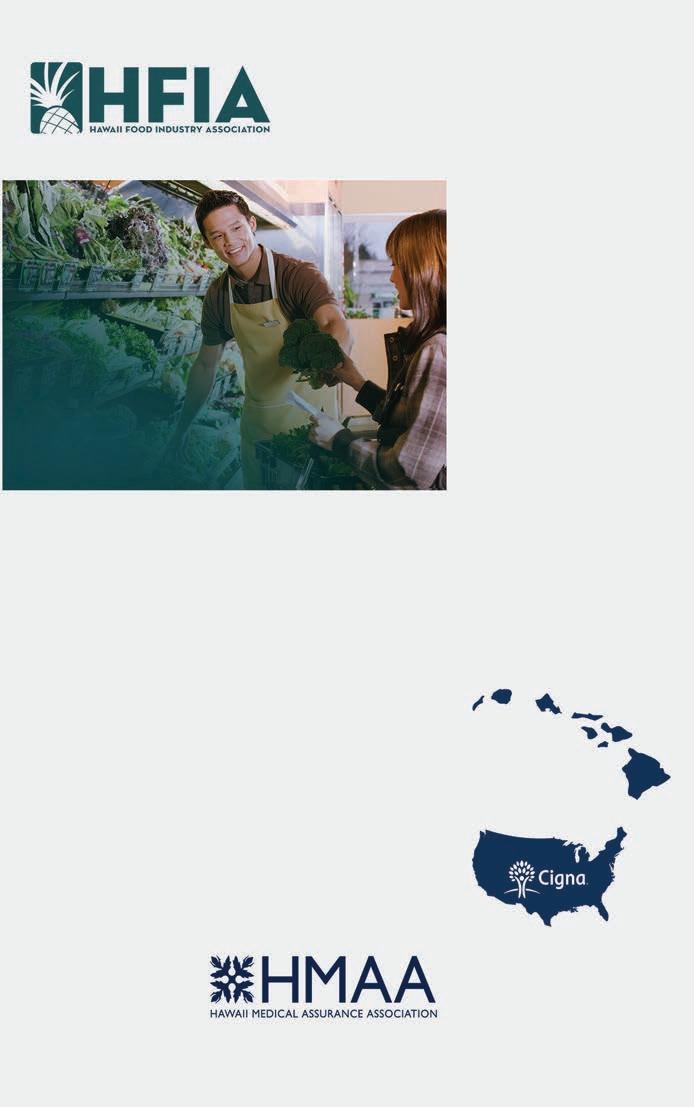
7 minute read
Legislative Update
BY LAUREN ZIRBEL
2020 at the State Legislature HFIA began actively engaging with legislators long before the start of the 2020 legislative session. We’ve been talking about our priority issues and making sure Hawaii’s senators and representatives understand how issues like wage increases and overregulation make it harder for the food industry to serve our communities. We’re also very pleased to be supporting a range of favorable legislation this year.
Advertisement
Joint House, Senate, Administration Economic Package HFIA is supporting several key components of this proposed package to ensure we get the best positive outcomes for HFIAmembers and avoid potentially damaging mandates.
Working-Class Tax Relief and Reasonable Minimum Wage Increases One of our top priorities is to lessen the burden of grocery taxes on all Hawaii customers, especially those with limited income. We’re supporting measures to increase the Refundable Food/Excise Tax Credit from $110 to $150, as well as other changes to make the credit more accessible and more meaningful to those in need.
We know our members are proud to pay fair wages, in addition to providing their team members with benefits like health care. We are not opposed to a reasonable increase in the minimum wage to $13 per hour by 2024. We are in strong support of addressing cost of living increases also addressed in this package, including universal pre-k and affordable housing.
This compromise package will help ensure that local businesses have time to prepare and adjust to minimum wage increases. Passage of a balanced package such as this one doesn’t unduly punish small businesses, as a more aggressive wage mandate would, and takes into account the cost of living issues that drive poverty. We continue to highlight existing employee benefits and protections paid for by employers, such as health insurance and temporary disability insurance, and to encourage legislators to consider these when drawing up any new legislation.
The Economic Impact Statement Act HFIA is in strong support of this measure. Economic impact statements would provide an approximation of the costs and benefits attributable to any change in the law before the passage of a given bill, effectively laying out the impact on private organizations and individuals in the state. SB3163 to mandate economic impact statements recently passed its first hearing.
Reducing Taxes on Food and Beverages
Taxing groceries is the most regressive way to tax! Thirty-six states do not tax groceries. Seven states have a lower tax for groceries. It would be a great benefit to all residents of Hawaii, in particular those in the lower income brackets, for the state to exempt food and medical services from the GET. Hawaii residents already struggle with some of the highest costs of living in the country. We believe changes to the Food/ Excise Tax Credit have a high chance of success in the immediate future, so we’ll be advocating for both approaches to reduce this burden.
Family Leave The Family Leave study was released late last year, but several legislators have noted that the study is somewhat incomplete. We’ve also noticed that the research was completed from a perspective of how to create a family leave program, not whether to create a family leave program. It recommends that any program have an implementation timeline of at least two, but preferably three years.
Two bills have already been heard that would provide family leave insurance benefits and extend periods of family leave to sixteen weeks for businesses that employ one or more employees who meet the hourly
qualifi cations. HFIA has testifi ed in opposition to House Bill 2219, which was deferred. HFIA also opposed Senate Bill 2491; however, this bill passed its fi rst committee.
Workforce Training Our number one complaint from members is the lack of qualifi ed candidates for hire. We’re pleased to be backing a wide range of bills to create employee training programs and improve workforce readiness. HB1915, HB2092, SB2065, and SB2259 create a workforce readiness programs in the Department of Education. SB2073 would establish a career pipeline initiative. HB2508 and SB3013 incentivize public high schools to encourage students to obtain industry-recognized certifi - cations.
Manufacturing, Buying, and GrowingLocal Food Legislation, and in particular tax credits to help local manufacturing and local agriculture will benefi t Hawaii. We’re supporting manufacturing tax credits that will help grow and diversify our economy, keep more dollars in state, decrease our dependence on imports, and develop and strengthen the Made in Hawaii brand. HFIA supports HB2080 to create an income tax credit for Hawaii manufacturers, and SB3090 to establish an agricultural production tax credit will both have their fi rst hearings shortly. We’re also supporting a range of measures to provide manufacturing and other grants through the Hawaii Technology Development Corporation.
Bottles
HFIA supports eff orts to fi x the deposit beverage program, and we oppose measures that would make the program more expensive for customers or businesses without fi xing the long-running issues. We’ve testifi ed in opposition to HB2025 and SB2726, which would increase the administrative fee for the deposit beverage program in accordance with CPI. These beverage fee increase bills have passed their fi rst committees. We’re also opposing SB2720, which would prevent the state from buying beverages in plastic bottles. We oppose SB2727, which would change the exemption distance for a beverage dealer in a high-density area from two miles from a redemption center to one mile. This bill has also passed one committee as of this writing.
CONTINUED ON PAGE 8
FEATURED SPEAKER AARON DALY
Whole Foods Market Former Global Director of Energy Management
GRAB YOUR OPERATING COSTS BY THE HORNS
Hear from industry leaders about strategies to save money on lighting, HVAC, and other building operating costs and connect with contractors to make it a reality.
APRIL 29, 2020 | SHERATON WAIKIKI REGISTER FOR YOUR SPOT AT HAWAIIENERGY.COM/SYMPOSIUM
Flavored Tobacco Products Flavored cartridge vape products were recently banned at the federal level, and the national tobacco age has been changed to 21. There are concerted efforts this year to ban flavored tobacco products in Hawaii, including menthol.


HFIA has testified on many of these measures, asking for a more reasonable approach.
Additional Sunscreen Bans There are several bills this year aimed at banning all sunscreen ingredients other











than zinc and titanium dioxide. HFIA is opposing these measures based on the lack of scientific rationale for the bans, and the need for functional skin cancer prevention products. We also believe that these measures encourage consumers to buy sunscreen online, where it will be nearly impossible to enforce this legislation.
CBD We are in support of legislation to end confusion about these products. We support SB2050 to establish a regulatory framework for products containing CBD and SB2274 to regulate cannabidiol under the Department of Health.
Food Donation We support HB2234 to allow for the good faith donation of expired food, which has passed one committee thus far. HFIA also supports HB2706, which requires the Department of Health to promote food donation during normal, routine inspections of food establishments and expands liability protection for the donation of food.
Green Incentives Incentives are a powerful tool for positive change. Our businesses are already leaders in creating more sustainable practices in our industry. We’re in support of several measures that can help companies be more environmentally conscientious.
HFIA is supporting SB2548 to create a marine debris recycling pilot program. We’re also supporting calls to increase the fine for littering in SB2051.
Plastic Bans There are several bills and resolutions on banning certain types of plastic statewide. HFIA is actively participating in the still operational Plastic Working Group created by the legislature last year. We’re advocating for the legislature to allow the Task Force time to do its work, and not to pass any new legislation this year.
Unfortunately, the County of Maui is not waiting for the completion of the working group and has already introduced its own version of Bill 40.








